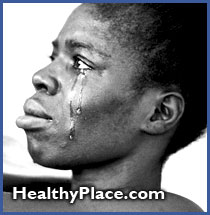Toxic Relationships: How to Handle Them
Online Conference Transcript
Pamela Brewer, Ph.D., has 15 years of experience working with people who are emotionally distressed or having marriage problems. Dr. Brewer says that there are times when the toxicity of our relationships with others is driven by a toxic relationship with yourself. As with many toxic substances, there are signs that may suggest you may need internal healing.
David Roberts: HealthyPlace.com moderator.
The people in blue are audience members.
David: Good Evening. I'm David Roberts. I'm the moderator for tonight's conference. I want to welcome everyone to HealthyPlace.com.
Our topic tonight is "Toxic Relationships: How To Handle Them."
Understanding that everyone in the audience might have a different level of knowledge, here's a link to give you the basic information about toxic relationships.
Our guest tonight, Pamela Brewer, Ph.D., has fifteen years of experience working with people who are feeling emotionally distressed or having marriage problems. She is based in Bethesda, Maryland, just outside of Washington, D.C. She also hosts a radio talk program.
Good evening, Dr. Brewer and welcome to HealthyPlace.com. We appreciate you being our guest tonight. So we're all on the same page, can you please define what a "toxic relationship" is?
Dr. Brewer: A toxic relationship is one in which you are feeling harmed either emotionally or physically.
David: What is it that causes us to get involved in toxic relationships?
Dr. Brewer: There are many reasons why we choose toxic relationships. We may have grown up in a toxic household, we may have been taught that we are not deserving of happiness, or we may have learned to take responsibility for others. One of the most important things to remember about being in a toxic relationship, is that you do have choices and you can get out!
David: Can you give us some examples of a toxic relationship?
Dr. Brewer: Wow! That's a big question! But here it goes.
A toxic relationship is one in which you are chronically tired, angry, or frightened. A relationship in which you worry about a safe time to talk to your partner. A relationship in which you do not have the "right" to express yourself. In short, a relationship that is abusive in any way may be a toxic relationship.
David: Many get involved in these types of relationships and find it difficult to break away. What is it inside ourselves that keeps us from being able to do that?
Dr. Brewer: Often, we stay in relationships because we do not understand that we have rights and options. Low self-esteem can be a factor in remaining, as well as depression, fear of being alone, or threats from the hurtful partner. Sometimes, people stay because the toxic relationship so much mirrors their lives as children, that they truly may not have a sense that it is a toxic relationship and that life can be better.
David: What is it that makes a toxic person tick? What motivates that person to hurt others?
Dr. Brewer: Low self-esteem. Although low self-esteem can be a very complex experience, the bottom line is that the person does not have a good and clear sense of themselves, and so it is almost impossible, without clinical intervention, for that person to understand that there is a better, healthier way to be.
Part of why the toxic person hurts, in addition to having to do with their own low sense of self, is that fear of being out of control and the fear of what exposing the true self would mean.
David: We have a lot of audience questions, Dr. Brewer. Let's get to some of them and then we'll continue with our conversation.
Dr. Brewer: Great!
michaelangelo37: Dr. Brewer, can you address the special issues when the toxic people are your parents who feel they deserve rights to your children.
Dr. Brewer: Tell me more about how they behave in a way that lets you know that they believe your children are theirs.
michaelangelo37: They express their displeasure to everyone about how they never see them, yet treat them badly when they do.
Dr. Brewer: How do they treat them badly? What do they do to the children?
michaelangelo37: They blame them for "acting like children," not allowing them to act age appropriate, and they over-discipline them.
Dr. Brewer: It's often very hard to set limits on parents, but the effects of not setting limits can be equally as difficult. How old are the children?
michaelangelo37: Seven and thirteen.
Dr. Brewer: How do they discipline them and have you told your parents that their behavior is objectionable to you?
michaelangelo37: Yes! I have expressed this to them many times and have limited their interaction with them. My mother has hit the youngest for wanting a snack and forced him to eat her mashed potatoes.
Dr. Brewer: How did she force him? What did she do?
michaelangelo37 At the time, my oldest reported that she forced the spoon of potatoes into his mouth.
Dr. Brewer: Were your parents abusive towards you as a child?
michaelangelo37: Yes! Most definitely.
Dr. Brewer: What you are describing is abusive behavior. It must be very painful to know that your parents are harming your children. So, are your parents doing to your children what they did to you?
michaelangelo37: Yes, it is very painful and I will not let the generational pattern continue. However, my parents now feel abandoned by me.
Dr. Brewer: Have you considered working with a clinical professional? This is such a painful and difficult experience. It sounds like you know that you have to protect your children from your parents, which means your children come first. You should feel very proud of yourself that you have been able to identify the abuse and are working to protect your children from the abuse.
Michaelangelo37, please do what you can to help yourself as you and your family work to stop the abuse and good luck to you.
SierraDawn: How about a relationship where one partner is giving what she feels is suggestions, and the other partner is seeing it as "criticism"?
Dr. Brewer: It may depend on how the "suggestions" are being offered. If they are being offered as suggestions and the other has the option to agree or disagree, then the issue may be with the person who is perceiving criticism. Which partner are you?
SierraDawn:I am the one that gives the suggestions.
Dr. Brewer: What might be useful, is communications skills counseling for both of you. You can start with some self-help books, but working with a counselor really might be the most useful thing for you both! Good luck.
David: And this pattern of behavior happens in many different types of relationships. Sometimes the "suggester" is really trying to control the other person by telling them "this is the right, the only way, (whatever it is) can be done." Am I right about that, Dr. Brewer?
Dr. Brewer: Yes, you are right. That's why communications skills training can be so useful. In part, such work really helps both to learn to speak for themselves; expressing their own thoughts and needs versus telling or interpreting for their partner.
babygirl62: Religion plays a big part in why I stay in my toxic marriage. Even our pastor told us it was toxic before we ever got married. How can I get to the point of "not going against God" and filing for divorce before it is too late for me and my kids? I am scared to "violate" the commandments. He has not committed any "thou shall not's," that would be o.k. to get a divorce. I cannot bring myself to go against what the Bible says.
Dr. Brewer: In a situation like yours, it might be useful to go outside of your church, but to still work with a counselor who has a stated understanding of your particular religious views. What makes your relationship a toxic one for you?
babygirl62: I have been in counseling, both Christian and secular, and all say to get out! However, I don't. He has been verbally and physically abusive, mostly to me but also to my kids.
Dr. Brewer: You are clearly in a difficult place. Consider that staying in a relationship in which you and your children are being harmed, may not be what was intended for you and your children. Does your partner agree with you that the relationship is toxic?
babygirl62: I love him, but also hate him at the same time. I raised one daughter by myself and don't want to see our son go through what she went through without her father being around. I understand and I agree, but I can't seem to "go against" God. And yes, he agrees.
Dr. Brewer: Some of what you will need to consider, I believe, is the harm and the "aloneness" that can come from being in an abusive household, both for you and your children. If your partner agrees that the relationship is in trouble, perhaps you both can go into a counseling environment, in which, you are jointly and actively engaged in making a change. Please consider all the ramifications in subjecting you and your children to the pain you currently endure.
Let me say to everyone, that the most difficult and most essential part of "dealing with" a toxic relationship is recognizing it and understanding that you do not deserve to be in a relationship that hurts, and that you have options. No one deserves to be harmed in any way. Furthermore, when there is abuse in a relationship, it doesn't just go away without a lot of very hard work.
David: Dr. Brewer, in each of these instances, it seems the questioner has difficulty standing up for him/herself. Do you have any suggestions for dealing with that?
Dr. Brewer: Reaching out for help can be an important part. Therapy can help, a support group (most are free) can help. Once you are in a toxic relationship, you are "taught" by your partner that it's really all your fault. If you buy into that philosophy, it can be very difficult to walk away from or set limits. However, limits must be set in order to live.
David: Here are a few audience comments on what has been said so far tonight.
babygirl62: We have separated several times. He then comes back saying he will change, and he doesn't. However, I can't lay all the blame on him because I like to control things also.
Ginger1: My husband has to have his own way. I have to ask permission to hang a picture.
Dr. Brewer: Don't kid yourself, because if your husband is such a controlling person that you need to ask permission to hang a picture, you are not the one in control. You describe the typical cycle of violence:
- a blow-up
- then the honeymoon period in which the abuser is contrite
- and then the abuse begins to escalate
- and then the explosion
- and then the honeymoon period
CalypsoSun: I grew up in a dysfunctional and abusive home, then had two abusive marriages. I had to totally disconnect with my siblings to regain healthiness. I am in a healthy relationship now but miss my siblings. I fear reconnection because of the toxicity. Any comments?
Dr. Brewer: If you have done work on yourself, and it sounds like you have, you may be stronger and in a better position to tolerate interaction with your siblings. However, remember that you have choices, and if they have not done work for themselves, you must limit your interaction with them. This is for your own emotional well-being and that is a very good thing to do!
cap1010: What if your relationship is not meant to be harmful, but you are just really bad at talking to people. Is that a toxic relationship? Can my toxic relationship just be me not being able to communicate with "friends"?
Dr. Brewer: Cap, I need an example of what you mean.
cap1010: Sometimes I feel I just cannot get my feelings out to people, or they just misconstrue what I say.
Dr. Brewer: Setting limits means that you too, have to pay attention to the limits you set. Cap, it sounds like working in a therapy group or support group, might be helpful for you to get some practice and learning how to say what you mean to. I can sense your sadness and frustration and you owe it to yourself to practice hearing your own voice.
David: For those in the audience, I'm interested in knowing what is it about you that got you involved in a toxic relationship?
Journeywoman_2000: I simply saw something better and thought it was healthy.
vioyoung: I came from a very dysfunctional family, with an alcoholic and emotionally abusive step-dad and a mom with serious emotional problems. They always made me feel unimportant, so that carried over.
michaelangelo37: The difficulty in my situation is that my parents do not respect the limits my wife and I have set. I was raised by toxic parents and had many unhealthy relationships, but I now have a healthy marriage.
Ginger1: My husband was charming before we were married.
David: Referring back to what causes someone to get into a toxic relationship, here's another question, Dr. Brewer:
vger2400: How are depression and self-esteem factors in toxic relationships? Does that mean that the person does not have a clear sense of their own boundaries and a fear of being out of control of their lives, or out of control of other people?
Dr. Brewer: When you are feeling depressed, it is hard to have clarity about your life and what is reasonable, appropriate, or respectful. Depression saps emotional and physical strength, both of which are critical in relationships. Low self-esteem tells one that they do not have rights or options, which is again, an energy drainer. And yes, depression can inhibit your sense of your own boundaries and your need and right to set boundaries with others.
vioyoung: I'm getting out of a toxic relationship (he has Narcissistic Personality Disorder), but I find myself feeling sorry for him because now he's being so nice. I know he's just trying to woo me back and nothing has changed. So, do you have any tips on how to not feel sorry for him?
Dr. Brewer: It's okay to feel sorry for him, as long as you don't feel responsible for him. You also have to remember that you have the right to a happy life!
vioyoung: Thanks, I keep telling myself that!
Dr. Brewer: As you should! :-)
David: That seemed to have hit a chord with some others in the audience:
babygirl62: Ouch! You hit the nail on the head when you mentioned feeling responsible for him. That is how I feel....:(
joe rose: Eric Fromm said that in order to be related to another person in a healthy productive way, one must first be properly related to oneself. Assuming you agree with that statement, how would you describe being properly related to oneself?
Dr. Brewer: The good news about recognizing that you are not responsible for your partner is that it frees you up for being responsible for yourself, and remember, as long as you accept responsibility for your partner, you are telling you and your partner that they don't have to change. Furthermore, that they are not responsible, that instead, you are! Now, that is not the message you want to give!
I wrote a book, Relationships In Progress, about just that idea! The way you begin to relate to yourself is to work at knowing yourself and then paying attention to the things you know, which means, not allowing your core values to fall by the wayside in a relationship.
kaybecca: What about in a marriage, when one partner tries to make the other feel worthless all the time?
Dr. Brewer: Kayrebecca, that really sounds like emotional abuse, don't you think? Emotional abuse is just as toxic as physical and sexual abuse and not okay!
tonny: Could you recommend a book about communication skills training?
Dr. Brewer: Yes, there is a wonderful book titled "Couple Skills" published by New Harbinger.
David: One thing I was thinking about, since we are a mental health site, many of the people who visit here have various psychological disorders ranging from anxiety disorder to bipolar disorder to DID and because of that, and the stigma it carries, they find it difficult to break away from any sort of relationship because they are afraid, and sometimes "anything is better than nothing."
Dr. Brewer: It is important to remember that when "anything is better than nothing," the "anything" is nothing. And a very hurtful nothing, at that, regardless of one's mental health diagnosis, the right to be in a loving and respectful relationship exists. No one should have to endure the pain of a toxic relationship. That being said, it is also important not to blame oneself for having a difficult time of breaking free, if breaking free is the only option. Toxic relationships are often the most difficult to leave.
David: As you were writing your answer, I was thinking to myself that it's important to remember that "breaking free" and the loneliness that occurs is temporary. And it's important to remember that "This too, shall pass."
Dr. Brewer: Absolutely! And what you are freeing yourself for, is a relationship that does not hurt.
David: Dr. Brewer's website can be found here.
slg40: Do you think we are afraid of the pain-free relationship and it might keep us trapped longer in a toxic one?
Dr. Brewer: People do often fear that with which they have no familiarity. What often keeps people in toxic relationships, in addition to the things we've already discussed, is sometimes the belief/fear that "this is all there is." That isn't true, but often that is the fear.
joe rose: Would you say that when one abandons his core values for the sake of maintaining a relationship, or placating one's partner, that this is the beginning of an unhealthy dependency on that partner for the sake of whom one has in a sense betrayed himself?
Dr. Brewer: Yes, self-betrayal is exactly what is going on when we allow ourselves to lose sight of our core values, and of course, we live in a world in which we are frequently encouraged to walk away from our internal value systems.
David: There were lots of people in the audience tonight, Dr. Brewer, who agreed wholeheartedly with what you had to say. Your comments and those of other audience members really struck home. Here are a few of their comments:
CalypsoSun: "This too shall pass!" Yes, sir! And it really does! Thank you, for that comment ;-) You said a MOUTHFUL there, Dr. Brewer! Thanks!
babygirl62: I agree with you, Dr. Brewer, about the emotional abuse being just as toxic as other abuses.
vger2400: They try to make all your decisions and second guess you on everything. We feel guilty when we do something nice for ourselves because we are so used to taking care of everybody else. I guess that is codependency.
punklil: So true!
Dr. Brewer: Ha-ha! Thank you, David, for sharing the comments.
David: Thank you, Dr. Brewer, for being our guest tonight and for sharing this information with us. And to those in the audience, thank you for coming and participating. I hope you found it helpful. I hope you'll visit our main site too. there's a lot of information there: http://www.healthyplace.com Also, if you found our site beneficial, I hope you'll pass our URL around to your friends, mail list buddies, and others.
Thanks again, Dr. Brewer. Good night everyone.
Dr. Brewer: David, thank you! Good night!
Disclaimer: We are not recommending or endorsing any of the suggestions of our guest. In fact, we strongly encourage you to talk over any therapies, remedies or suggestions with your doctor BEFORE you implement them or make any changes in your treatment.
APA Reference
Gluck, S.
(2007, May 10). Toxic Relationships: How to Handle Them, HealthyPlace. Retrieved
on 2026, January 1 from https://www.healthyplace.com/abuse/transcripts/how-to-handle-toxic-relationships








 Normally, usage rates for illicit drugs such as marijuana and cocaine are much higher for men than women. But for prescription drugs, the reverse is the case for teenage girls, said the White House Office of National Drug Control Policy.
Normally, usage rates for illicit drugs such as marijuana and cocaine are much higher for men than women. But for prescription drugs, the reverse is the case for teenage girls, said the White House Office of National Drug Control Policy.